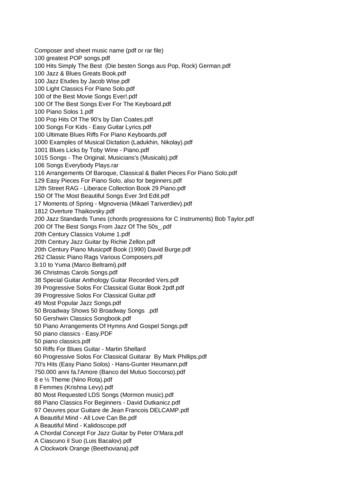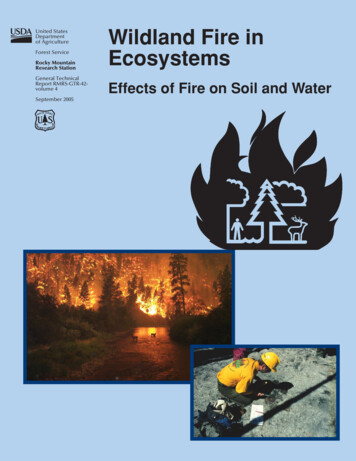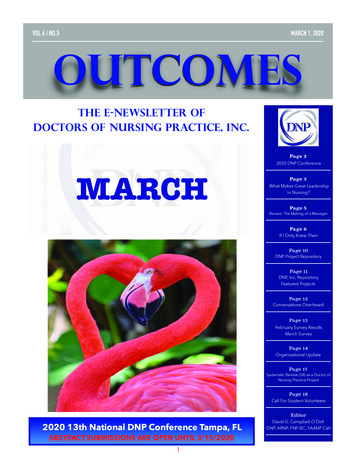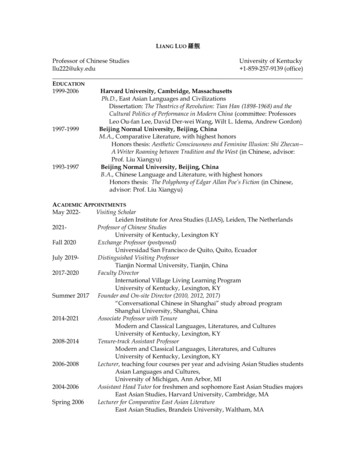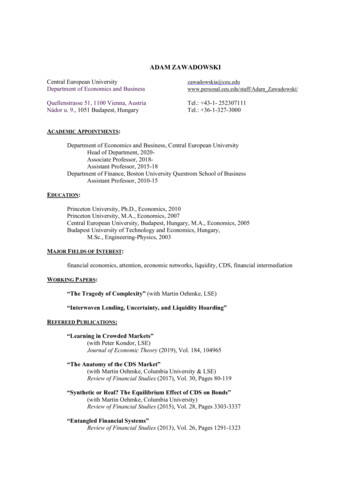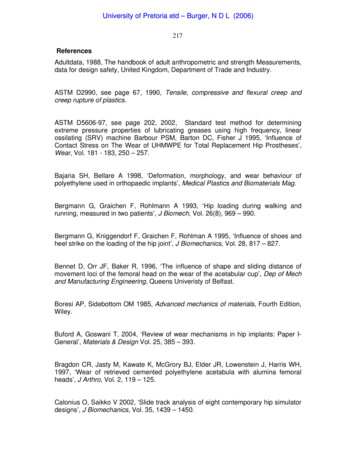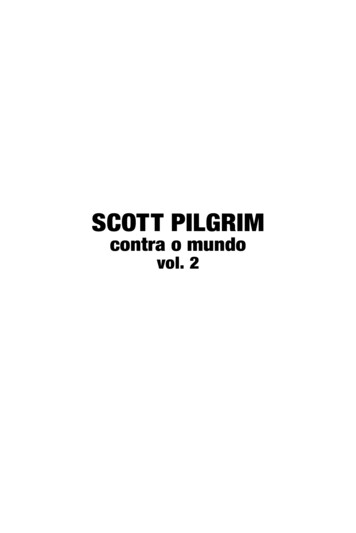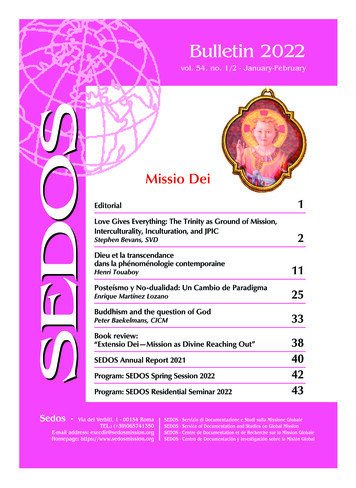
Transcription
Sedos50-1-2-2022.qxp 47-2015 22/02/22 10:53 Pagina 2Bulletin 2022SEDOSvol. 54, no. 1/2 - January-FebruaryMissio Dei1EditorialLove Gives Everything: The Trinity as Ground of Mission,Interculturality, Inculturation, and JPICStephen Bevans, SVDDieu et la transcendancedans la phénoménologie contemporaineHenri TouaboyPosteísmo y No-dualidad: Un Cambio de ParadigmaEnrique Martínez LozanoBuddhism and the question of GodPeter Baekelmans, CICMBook review:“Extensio Dei—Mission as Divine Reaching Out”SEDOS Annual Report 2021Program: SEDOS Spring Session 2022Program: SEDOS Residential Seminar 2022Sedos -Via dei Verbiti, 1 - 00154 RomaTEL.: ( 39)065741350E-mail address: execdir@sedosmission.orgHomepage: https://www.sedosmission.org211253338404243SEDOS - Servizio di Documentazione e Studi sulla Missione GlobaleSEDOS - Service of Documentation and Studies on Global MissionSEDOS - Centre de Documentation et de Recherche sur la Mission GlobaleSEDOS - Centro de Documentación y Investigación sobre la Misión Global
Sedos50-1-2-2022.qxp 47-2015 22/02/22 10:53 Pagina 3 ( * , , , . ) ( * - / / 0 ! " # ) - & , ) *. / " 0 , " , 1 / ' ,! . ) - 1 !2 " . 30*3 . 2 ! ! ' ) " # #%& ( " # " % " & ' % ( & ((( " & " &) ' & * ' ( ) ' "
Editorialsaid that “there is no God in Buddhism”, butthis is based on a certain (mis-)conception ofwhat or who God is. Buddhism teachesrespect for his/its “hiddenness”. It is only inthe silence of the heart that God’s love andwisdom for this world is perceived in depth.This reasoning has been developed more indepth in a consequent book on “The ‘god’ ofBuddhism” that will soon be published byAngelico Press, New York, and an Italianversion of the book is on the way as well.Dear Readers,The theme of this Bulletin,Missio Dei, is taken from theresults of the SEDOSMission Symposium of lastyear when it was concluded that “Missionstarts in the mind/heart of God”. Thus, thequestion that arises is: “Who is God?” Westart therefore with the article by Fr. StephenBevans who describes “that greatinterpersonal movement or ‘dance’ amongthe Three Persons of the Holy Trinity: HolyMystery, Holy Word, and Holy Spirit,” andour own participation in “God’s life ofmission” through giving everything, as thelove of the Triune God teaches us.We end this reflection on how we canunderstand God in the context of missionwith a book review of the latest work by Fr.Jacob Kavunkal, SVD. He speaks in linewith the article by his confrere StephenBevans by stressing the idea of the extensiodei, the “divine who reaches out” in mission,with His love for his creation: Mission as a“Divine Reaching Out”. At its root is thebiblical narrative of divine goodness,culminating in the ministry, death andResurrection of the Incarnate Word of God,continued in the creation of the Church, atthe service of the “divine self-reaching out.”From this basic understanding of God as aHoly Trinity, we move to a more (post-)modern question about the transcendence ofGod. Is it correct to present God only as apersonal creator god? What about the“hiddenness” of God, the deus absconditus?The current understanding of God seems tofocus on this ‘forgotten’ aspect of Christiantheology. We start therefore with a longerphilosophical article by Henry Touaboy thatseeks to point out the immanence within thetranscendence of God’s Being. The reason isthat if God would be perfectly transcendentwe would not be able to know of Him.Every year, SEDOS holds a GeneralAssembly for its more than 80 memberCongregations. We publish here the AnnualReport that the Director of SEDOS presentedat the General Assembly which was held atthe Generalate of the Lasalle Brothers, on 10December 2021.The next—more radical—article is from thepen of Enrique Martínez Lozano whoconsiders this move towards a more “nondual” vision of God and human beings as aparadigm shift which he calls “post-theism”.It wants to move away from the I and Thouview in theology to an understanding of Godas “the common foundation of all beings our ultimate identity-,” and to perceive it as“the greatest cohesive force.”To close this Bulletin, we would like toinform our Readers of two upcoming eventsof SEDOS, namely the Spring Session on thetheme of Mission in a Secular Europe, andthe Residential Seminar on the theme ofFormation for Mission. One can see from theprograms that the contributions to thesethemes will be rich and that ourunderstanding of mission in these fields willbe enriched as well.I am the author of the last article. My interestin Buddhism as a missionary to Japan led meto reflect on the question of whetherBuddhism has an experience of God. It isPeter Baekelmans, CICMDirector of SEDOS1
Stephen Bevans, SVDLove Gives EverythingThe Trinity as Ground of Mission, Interculturality, Inculturation, and JPICRichard Rohr has put it beautifully, God isnot being but interbeing, the Trinity is notthe dancers, but the dance itself.2 And so it iswith us and everything. As images of God,we exist as interbeings, caught up in thedance. Everything is interrelated, ascontemporaryscientists,especiallyphysicists, tell us.3The triune God is Love Giving Everything,“before” the world’s creation—againspeaking metaphorically—from its firstnanosecond, every nanosecond thereafter,and every nanosecond into the future. NewTestament scholar Michael J. Gormanreflects on the hymn that Paul quotes in theletter to the Philippians (2:6-11), suggestingthat the English of the first line might berendered both as “Although he was in theform of God ” and “Because he was in theform of God.” The former—“although”—iswhat he calls the text’s surface structure; thelatter—“because”—he calls the text’s deepstructure. “Although he was in the form ofGod,” points to how “Christ acted differentlythan ‘normal’ gods act.” “Because he was inthe form of God” points to the fact that“Christ acted as he did because that is thecharacter of true divinity.”4 Perhaps it wouldnot be out of place to paraphrase ThomasAquinas as quoted by Pope Francis inEvangelii Gaudium: “it is proper to God toempty Godself, through which God’sLecture given to the SVD Community inRome, January 15, 2022, at the occasion ofthe feast day of the Founder of Society ofDivine Word, Arnold Janssen (1837-1909).As you see from the title of my presentation,it might look like this essay should really befour essays! However, it is important to seethat all four of these topics are interrelated,and in a kind of Trinitarian perichoresis—that great interpersonal movement or “dance”among Holy Mystery, Holy Word, and HolySpirit—they explain one another, enrich oneanother, play with one another. Like theTrinitarian persons, we can focus on thesedistinct topics, but we only can fullyunderstand them when we grasp them alltogether. They are each one and all, differentways of understanding and participating inthe truth that Love Gives Everything!1Love Gives Everything! What a wonderfulway of expressing the inexpressible reality ofour Triune God, and our own participation inGod’s life of mission! That God is LoveGiving Everything points to the metaphorthat God is a verb, a mystery, as Gloria hasshown us, of flourishing relationship, aloving that moves out of itself and drawsothers in—humans, animals, every particle ofcreation. Theology in its own stuttering waytells us that the divine “persons” are personsnot in their own right, but only insofar as theparticipate in relationship—with one anotherand with everything that exists. And so it iswith us. The famous African proverb tells usthat “I am because we are,” and that is truebecause we are made in God’s image. As2 Richard Rohr, Disk One of The Divine Dance: Exploring the Mystery of theTrinity, 2004.3 See Pope Francis, Encyclical Letter Laudato Sì cyclicals/documents/papafrancesco 20150524 enciclica-laudato-si.html, 138. In her paper at the SSNDSymposium, Gloria Schaab quotes Heesoon Bai and Hartley Banack, “’To See a1 This essay was originally written for a Symposium on the Trinity, sponsored byWorld in a Grain of Sand’: Complexity Ethics and Moral Education,” Complicity:the School Sisters of Notre Dame (SSND), July 27-29, 2021. The title is inspired byAn International Journal of Complexity and Education 3:1 (2006): 5–20 at 9–10.the document “Love Gives Everything,” Directional Statement, School Sisters of4 Michael J. Gorman, Becoming the Gospel: Paul, Participation, and MissionNotre Dame, 24th General Chapter, October 24, 2017.(Grand Rapids, MI: Eerdmans, 2015), 119 and 106, note 6.2
omnipotence is manifested in the greatestdegree.” 5 God is Love Giving Everything:Holy Mystery emptying Godself intocreation through the Word made flesh,through the gentle and tender power of theHoly Spirit—so that “the darkness of sin andthe night of unbelief” might “vanish beforethe light of the Word and the Spirit ofgrace.”6It is this Love Giving Everything, this “Verbin which all beings participate, move, andhave their being. not limited by any objectbut soaring everywhere,”7 that is the groundof the church’s mission, its commitment toinculturation and interculturality, and itscommitment in mission to justice and peace.It will be the exploration of this ground onwhich this presentation will focus.could do it all by Godself. But then he said,perhaps the reason was that God liked towork with others, and so involved others bycalling them as disciples. God could havedone it by Godself, but God chose to do itwith others. It was a really lovely, faith-filledreflection, and very well done.This fine reflection, however, stimulated meto think in a different direction, and push abit more daringly. I was already thinkingabout writing the text of this presentation,and so my creative juices began to flow.Perhaps, I began to think, that Jesus chosedisciples to help him with his work was nocaprice; it was not something that he simplydecided to do just because he wanted to.Jesus, as God, could not have done it byhimself, because God can never can doanything by God’s self. This is the point ofthe Trinity. To be God is never to be alone.And so, in calling disciples, Jesus reveals thetrue nature of God as a communion ofpersons, a communion-in-mission. The HolyMystery that is God empties Godself byuttering the Word, the breathing forth andthe breathing back of which is the HolySpirit. God is never alone. God is LoveGiving Everything.And because God is never alone God neveracts alone. It is God’s nature to be a partner.When God creates, what is created becomesa partner, invited to freely participate inGod’s continuously creating work. AsElizabeth Johnson writes, “it is if at the BigBang the Spirit gave the natural world a pushsaying, “Go have an adventure, see what youcan become.” 8 When God reveals Godself,those to whom God reveals Godself becomepartners, for revelation is not simply thecommunication of knowledge, but an offerof friendship, as Vatican II puts it, an offer toshare God’s very life.9 When God works toheal and redeem the world from the power ofevil and sin, those whom God heals andredeems become partners in healing and(Photo by Joshua Earle on Unsplash)MissionIn early January 2021, one of our theologystudents in the formation house where I live,Roger Kyaw Thu from Myanmar, offered ashort reflection at our daily Eucharist (whichwe are so lucky to have during this time ofpandemic!) on the day’s gospel, Mk 1:14-20,the call of Simon and Andrew and James andJohn. Roger began by wondering why Jesuscalled disciples at all, since, being God, God5 Thomas Aquinas, Summa Theologiae, II-II, question 30, ad 4, Respondeo. SeePope Francis, Apostolic Exhortation Evangelii Gaudium ost exhortations/documents/papafrancesco esortazione-ap 20131124 evangelii-gaudium.html, 37.8 Elizabeth A. Johnson, Ask the Beasts: Darwin and the God of Love (London:6 This is the prayer of St. Arnold Janssen, the founder of the Society of the DivineBloomsbury, 2014), 156.Word, to which I belong.9 Vatican Council II, Dogmatic Constitution on Revelation, Dei Verbum (DV),7 Elizabeth A. Johnson, She Who Is: The Mystery of God in Feminist Discoursehttps://www.vatican.va/archive/hist councils/ii vatican council/documents/vat-(New York: Crossroad, 1992), 239. Johnson, of course, is alluding to Acts 17:28.ii const 19651118 dei-verbum en.html, 2.3
redemption. Holy Mystery, the Love thatGives Everything, is revealed in the worldthrough the Word made flesh, Jesus ofNazareth, who is anointed by the Spirit at hisbaptism to “bring good news to the poor, to proclaim release to the captives andrecovery of sight to the blind, to let theoppressed go free” (Lk 4:18).Here we see the essence of God’s missionand the church’s mission as rooted inTrinitarian life. The overflowing fountain oflove that is the deepest reality of God’smystery, sends the Word into the world bythe power of the Spirit.10 Jesus of Nazareth,that incarnate word, gathers disciples, andafter his death—by which he loved hisdisciples “to the end” (Jn 13:1)—bestowedon them the same Spirit that had anointedhim and had raised him from the dead (Jn20:22-23; Rom 8:11). In this way the missionof God is shared with the church, and so thechurch is truly “missionary by its verynature,” a “community of missionarydisciples.”11The Eastern tradition of Christian theologytalks about how Christians share God’s lifeand mission as theosis or deification. Thereare strong Pauline (e.g. adoption) andJohannine (vine and branches) roots to thisidea, but perhaps the main text to whichEastern Christians refer is that of 2Pet 1:4:God has given us the power to “becomeparticipants in the divine nature.” GregoryNazianzus, for example, speaks of theChristian as a “zoon theoumenon,” or “ananimal that is being deified.”12 One could getthe impression that the process of theosis issomething that is only personal, spiritual.Michael J. Gorman, however, insists thattheosis is always missional theosis.13Baptism plunges us into the very life of theTriune God, who is a missionary God, and soto share God’s life is to participate in God’svery mission. “Discipleship,” says the WorldCouncil of Churches’ “The Arusha Call toDiscipleship,” “is both a gift and a calling tobe active collaborators with God for thetransforming of the world (1Thessalonians3:2). In what the church’s early theologianscalled ‘theosis’ or deification, we shareGod’s grace by sharing God’s mission.” 14For Orthodox theology, missiologist PetrosVassiliadis insists, “human nature was neverconsidered as a closed, autonomous, andstatic entity; its very existence was alwaysdetermined by its relationship with God.Guided, therefore, by a vision of how to‘know’ God, and ‘participate’ in His life,Christian witness is closely connected withthe notion of a synergetic theology of theosisor deification.” 15 Romanian Orthodoxtheologian Cristian Sonea sees a strongconnection between Eucharist and amissionary understanding of theosis.16Mission and its Trinitarian ground isintimately connected to the other three topicsthat I will reflect on in this presentation, andit will be more and more developed as wereflect on each of them. What I want to stresshere, however, is that God, in God’s triunenature as Love Giving Everything,incorporates us into the divine life sointimately that we become ourselves partnersin that Love that Gives Everything.14 World Council of Churches’ Conference on World Mission and Evangelism,2018, “The Arusha Call to Discipleship,” International Review of Mission, 107.2(407), (December, 2018): 542.10 See Vatican Council II, Decree on Missionary Activity (AG),15 Petros Vassiliadis, “Joining in with the Spirit in the 21st Century: A Response tohttp://www.vatican.va/archive/hist councils/ii vatican council/documents/vat-Dana Robert,” given at the celebration of the completion of the Regnum Booksii decree 19651207 ad-gentes en.html, 2.series on the Edinburgh 1910 Centenary, Oxford, September 4, 2015. This paper, to11 AG 2; EG, 24. You Are Sent, Constitution of the School Sisters of Notre Damemy knowledge, has never been published, but Dr. Vassiliadis very kindly sent me a(1986), Prologue; I.2.manuscript copy of his paper, after I heard him deliver it in person at the Oxford12 Kallistos Ware, Orthodox Theology in the Twenty-First Century (Geneva: WCCcelebration.Publications, 2012), 44.16 Cristian Sonea, “The Liturgy after the Liturgy and Deep Solidarity: The13 Michael J. Gorman, Abide and Go: Missional Theosis in the Gospel of JohnOrthodox Understanding of Christian Witness and Its Implications for Human(Eugene, OR: Cascade Books, 2018), 8-13.Society,” Mission Studies, 37 (2020): 466-68.4
7:24-29) who so desperately needed his help.HerdesperationawakenedJesus’compassion. He “listens to her. He comes tohis senses and remembers who and what heis. This woman, in her weakness andneed, shows Jesus God’s dream forhumanity. He listens to the Spirit,awakening in his humanity God’s allinclusive and humanitarian dream.”20 What amarvelous portrait of Trinitarian mission inaction! We might imagine that this powerfulencounter with a person of another cultureinspired Jesus to tell the story of the GoodSamaritan (Lk 10:25-37). Jewish NewTestament scholar Amy-Jill Levine offers astunning commentary on the radicality of theparable with a powerful, present-dayanalogy: “The man in the ditch is an IsraeliJew; a rabbi and a Jewish member of theIsraeli Knesset fail to help the wounded man,but a member of Hamas shows himcompassion.”21 Pope Francis, concluding hisreflection on the parable in Chapter Two ofhis 2020 encyclical Fratelli Tutti, links itsmessage with the triune God: “believerscome to know that God loves every man andwoman with infinite love and ‘therebyconfers infinite dignity’ upon all humanity. If we go to the ultimate source of thatlove which is the very life of the triune God,we encounter in the community of the threedivine Persons the origin and perfect modelof all life and society.”22Francis’s words point to an important movein Trinitarian theology, first articulated byKarl Rahner in more formal theologicallanguage, but later expressed by CatherineLaCugna, interpreted by Kathleen Cahalan,in language that is more accessible: “whoGod is in essence is what God does.”23 WhatInterculturalityThe SVD 2018 General Chapter stated:“Moved by the Spirit of Jesus, we build ourcommunities interculturally when weexperience relationships of trust, openness,co-responsibility, mutuality and fraternity.Striving to live as truly interculturalcommunities is already a key element of ourSVD mission.” 17 How, however, isinterculturality connected with Trinitarianlife and mission?One powerful way of thinking about missionis to connect it with the completion ofcreation. God’s mission, in which Christiansare called to participate, is a commitment towork with God in continuing and completingGod’s dream of creation’s full flourishing.Israel was called to work with God inbringing about a blessing for all nations (Gen12:3), a blessing expressed so beautifullyespecially by the prophet Isaiah (see, forexample, Is 2:2-5; 11:1-9).18 Jesus, anointedby the Spirit, expressed this vision in the“manifesto” of his mission in the synagogueat Nazareth (Lk 4:16-16-21). He spoke of it,as Mark reports (1:15), as the imminentcoming of the reign of God—a term thatmight be better rendered as the “Kingdom ofGod,” or in the wonderful phrases of WillieJennings and Gregory Boyle, God’s reign of“revolutionary intimacy,” and “radicalkinship.” 19 At the heart of his vision wasintercultural harmony and energy.Jesus of Nazareth, like us in all things but sin(Heb 2:17; 4:15), was thoroughly a Jew, withall the Jewish prejudices about foreigners andnon-Jews, but, as Argentinian NewTestament writer Adriana Milmanda, SSpS,argues, Jesus was able to overcome hisprejudices as he encounters the Canaanite /Syro-Phoenician woman (Matt 15:21-28; Mk20 Adriana Carla Milmanda, SSpS, “The Intercultural Journey of Jesus,” in ed.Maria Cimperman, RSCJ and Roger P. Schroeder, SVD, Engaging Our Diversity:17 Statement of the General Chapter, 2018, 3.2, 27,Interculturality and Consecrated Life Today (Maryknoll, NY: Orbis Books, hapter/gc2018/docs/1808docen.htm.70.18 For a powerful elaboration of the mission of Israel, see Christopher J. H. Wright,21 Amy-Jill Levine, The Misunderstood Jew: The Church and the Scandal of theThe Mission of God: Unlocking the Bible’s Grand Narrative (Downers Grove, IL:Jewish Jesus (New York: HarperOne, 2006), 149.IVP Academic, 2006), 191-264.22 Pope Francis, Encyclical letter Fratelli Tutti (FT),19 Willie James Jennings, Acts (Nashville, TN: Abingdon, 2017), 29; encyclicals/documents/papa-Boyle, Tattoos on the Heart: The Power of Boundless Compassion (New York:francesco 20201003 enciclica-fratelli-tutti.html, 85.Free Press, 2010), 187-212; Barking to the Choir: The Power of Radical Kinship23 Kathleen A. Cahalan, Introducing the Practice of Ministry (Collegeville, MN:(New York: Simon & Schuster, 2017).The Liturgical Press, 2010), 149, referring to Catherine Mowry LaCugna, God for5
this means is that, as we see God at work inJesus, inspired by the Spirit, we get anunderstanding of who God is in God’sdeepest reality—working to realize thedivine dream of “radical kinship” among allpeoples, and with the whole of creation. Thisworking for community reveals the secret ofwhat God is in God’s self: a community, arelationship of radical equality, dialogue, andsharing, a model for the human task ofinterculturality that will realize God’s dreamfor creation. How God works in the world for“radical kinship,” through Jesus of Nazareth,through the Holy Spirit, is described inclassical theology as God in Godself beingcommunity of radical equality and diversityin unity. God is what God does: “At the heartof holy mystery is not monarchy butcommunion; not absolute rule, but threefoldkoinonia.” 24 Trinity is the mystery of LoveGiving Everything, calling us to do the samewith one another.We see this call for equality and diversityamong ourselves in the great story in Acts 10of the “conversion of Peter,” as JustoGonzález calls it.25 Peter does what could becalled something unthinkable. He accepts anon-Jew, a member of the army that isoccupying his country, into the Jesuscommunity, and actually eats with Corneliusand his family. Peter’s conversion, as well asthat of Cornelius, was clearly a work of theSpirit that fell upon him and his household.“‘Can anyone withhold the water forbaptizing these people who have received theHoly Spirit just as we have?’ So he orderedthem to be baptized in the name of JesusChrist” (Acts 10:47-48). Several chapterslater, when doubts were raised about thesuperiority of Jewish culture over that ofGreek understandings of Christianity inAntioch, the Spirit of Jesus was at workagain. As the letter sent to the Antiochcommunity stated that “it has seemed goodto the Holy Spirit and to us to impose on youno further burden than these essentials”(Acts 15:28).Sometimes the famous verse from Gal 3:28is strongly critiqued. I recently heard tell ofan Aboriginal woman who said that shethought it was the most oppressive verse inthe Bible since it erased differences, callingfor assimilation into the culture of theWest.26 I think we need, rather, to interpret itin the light of Paul’s insistence that the unityin Christ the verse attests to—no longer Jewor Greek, slave or free, male or female—isthe unity in diversity that the Spirit of Christcreates. This is attested to in 1Cor 12: “Nowthere are varieties of gifts, but the sameSpirit; and there are varieties of services, butthe same Lord.” Intercultural living isintimately tied to mission, as the statementfrom the SVD 2018 General Chapter insists.However, missiologist Andrew Walls’sinterpretation is also powerful andchallenging for us in terms of intercultural(Photo by Santiago Sauceda from Pexels)25 Justo L. González, Acts: The Gospel of the Holy Spirit (Maryknoll, NY: OrbisUs: The Trinity and Christian Life (New York: HarperOne, 1991), 411. Rahner’sBooks, 2001), 134.famous phrase is “The economic Trinity is the immanent Trinity, and vice-versa.”26 This was a remark made in a Webinar on “Apostolicity and InterculturalSee his The Trinity (New York: Continuum, 1970), for example, 21-24, 82-103.Theology,” sponsored by the Overseas Ministries Study Center, Princeton, NJ,24 Johnson, She Who Is, 216.given by John G. Flett on January 14, 2021.6
living. He speaks of an “Ephesian Moment”when two cultures—Greek and Jewish—succeeded to live together in a mutuallyenriching and challenging way. Neither “wasa form of Christian faith complete and validin itself, apart from the other. Each wasnecessary to the other, each was to completeand correct the other; for each was anexpression of Christ under certain specificconditions, and Christ is humanitycompleted.”27 I don’t think that we can get abetter description of a Trinitarian-groundedlife of interculturality than this. The Lovethat Gives Everything calls us to a life ofloving and giving as we live with one anotherand work for the “revolutionary intimacy” ofGod’s Kindom.“I know so little,” exclaims Denise Levertovin prayer, “You have brought me so far.” “Iknow enough about you,” writes WilliamCleary in a beautiful prayer, “to hesitate toname you in any particular way.”30In the midst of her beautiful chapter on theTrinity in She Who Is, Elizabeth Johnsonadmits that language about God in generaland the Trinity in particular “is not a literaldescription of the inner being of God who isin any event beyond human understanding.”This is because, as Thomas Aquinas says“we cannot know what God is, but only whatGod is not,” and so “such speech is alwaysindirect, having a metaphorical, analogical,or symbolic character. No concept isadequate, no model mirrors directly.” 31 Weknow God, as Rilke says, “when our heartswould simply open,” in our experience ofbeing taken up by the Spirit to recognizeGod’s saving power in Jesus the Christ.But this does not mean that we must remainspeechless, nor does it mean that ourlanguage about God is totally meaningless.This is because, from the first moment ofcreation, the moment of the Big Bang, theSpirit has been present and active, pointingto the holiness of all that is. “The world ischarged with the grandeur of God,” GerardManley Hopkins writes, “Because the HolyGhost over the bent / World broods withwarm breast and with ah! bright wings.” 32Language of God is not meaningless,because, as Graham Kings writes, “For God,matter matters: for the Word becameflesh.”33 As my friend and former professorDavid Burrell once said in class, ourlanguage about God is like an arrow: it neverhits the bull’s eye, but it does hit the target.InculturationWhat is always important as we reflect on theTrinity is to cultivate a healthy apophaticsense. We need to know that we are dealingwith mystery, and that any language we useis more untrue than it is true. The Americanpoet Christian Wiman speaks of God as “mybright abyss.”28 One of my favorite poems ofRainer Maria Rilke reads:We must not portray you in king’s robes,you drifting mist that brought forth themorning.Once again from the old paintboxeswe take the same gold for scepter and crownthat has disguised you through the ages.Piously we produce our images of youtill they stand around you like a thousandwalls.And when our hearts would simply open,our fervent hands hide you.29York: Riverhead Books, 1996), 50.30 Denise Levertov, “The Beginning of Wisdom,” in The Stream and the Sapphire:Slected Poems on Religious Themes,” (New York: New Directions, 1997), 29 (2829); William Cleary, We Side with the Morning: Daily Prayers to the God of Hope27 Andrew F. Walls, “The Ephesian Moment,” in The Cross-Cultural Process in(Notre Dame, IN: Sorin Books, 2009), Prayer for November 8 (no pagination).Christian History (Maryknoll, NY: Orbis Books, 2002), 78.31 Johnson, She Who Is, 200, 201. The middle quotation is from Aquinas, Summa28 Christian Wiman, My Bright Abyss: Meditation of a Modern Believer (NewTheologiae, I, Preface to Question 3.York: Farrar, Strauss, and Giroux, 2013); “2047 Grace Street,” in Hammer is the32 Gerard Manley Hopkins, “God’s Grandeur,” in The Major Works (Oxford:Prayer: Selected Poems (New York: Farrar, Strauss, and Giroux, 2016), 100.Oxford University Press, 2002), 128.29 Rainer Maria Rilke, “Wir dürfen dich nicht eigenmächtig malen,” in Rike’s Book33 Graham Kings, “Matter of Great Moment,” in Nourishing Connectionsof Hours: Love Poems to God, translated by Anita Barrows and Joanna Macy (New(Norwich, UK: Canterbury Press, 2020), 4.7
Both these truths—that we cannot speak ofGod directly, but can indeed speak of God, asElizabeth Johnson says, “allusively”—are theTrinitarian grounds of inculturation. God isLove Giving Everything. We can’t ever takeit all in. But Love Gives Everything, and soanything is able to reflect the mystery—aslong as we are aware of language’s, image
"Extensio Dei—Mission as Divine Reaching Out" 38 SEDOS Annual Report 2021 40 Program: SEDOS Spring Session 2022 42 Program: SEDOS Residential Seminar 2022 43 vol. 54, no. 1/2 - January-February . 2 Richard Rohr, Disk One of The Divine Dance: Exploring the Mystery of the Trinity, 2004.

